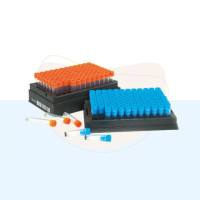Expression Screening of cDNA Libraries in pEX
互联网
599
Most methods for screening libraries of cDNA clones rely on the selective binding of either nucleic acid probes to cDNA molecules or antibodies to the polypeptide gene product encoded by the cDNA. Although screening of cDNA libraries with synthetic oligonucleotide probes is undoubtedly a powerful procedure, it is not always the easiest way to clone a cDNA, especially if the equipment for amino acid sequencing and oligonucleotide synthesis is not readily available. The oligonucleotide probe synthesized from the back-translated amino acid sequence of the protein must accommodate the degeneracy of the genetic code either by being a mixture of several sequences, or by being sufficiently long to give hybridization at moderate stringency from a single sequence (1 ). It cannot always be guaranteed that an easy-to-sequence area of a protein (e.g., the amino terminus) will be present in a cDNA library (where the 5′-end is frequently missing), and simply obtaining sufficient pure protein to perform amino acid sequencing can be a problem. On the other hand, polyclonal and monoclonal antibodies are relatively easy reagents to obtain and, in the latter case, have a built-in purity, being themselves derived from a cloning procedure.









